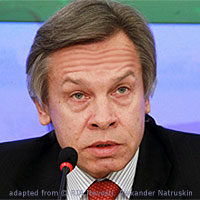Pushkov sees rudiments of Cold War in Obama’s policy

(Interfax – MOSCOW, August 12, 2013) The administration of U.S. President Barack Obama has not yet given up Cold War methods in its relations with Moscow, thus, it supports the anti-Russian rhetoric voiced by other U.S. authorities and mass media, Russian State Duma Foreign Affairs Committee Chairman Alexei Pushkov said.
“In my point of view, regarding Russia, Obama again walks the road, which was taken by the Bush administration: in the understanding of U.S. leaders any disagreement with the United States is interpreted as moving towards cold war and cooperation – in the understanding of the current administration and as it was in Bush’s understanding – means utter agreement with the United States,” Pushkov told Interfax on Monday when commenting on Obama’s statements regarding Russian-U.S. concerns.
If one were to compare the degree of tension in anti-Russian rhetoric in the United States and anti-U.S. sentiment in Russia, the former is higher, Pushkov said.
“When the U.S. president talks about increasing anti-U.S. rhetoric in Russia, it is strange that he does not notice that much more active anti-Russian propaganda has been expressed by U.S. mass media and Congress in the past 18 months, which sometimes reaches such hysterical notes that the anti-U.S. rhetoric in Russia has never reached,” Pushkov said.
Thus, Obama’s statements on curbing anti-U.S. rhetoric with “absolutely no wish” to analyze his own policy and situation with regard to anti-Russian rhetoric show that his approach is one-sided and that he hopes to convince everyone that only the policy that the United States is backing is immaculate, Pushkov said.
If one were to objectively analyze the current policy of the United States regarding Russia, rudiments of the Cold War are easily found, the official said.
“It was completely obvious during the previous administration. But the current administration has not given up those aspects of its foreign policy, which can be well interpreted as (those) aimed against Russian security interests,” Pushkov said.
According to Pushkov, there are enough reasons to say this. “If this is not correct, why does Obama’s administration say that it is ready to guarantee that the U.S. missile shield in Europe is not directed against Russia – why do they give us verbal promises alone and not legal guarantees?” Pushkov said.
The situation with NATO is an indicator, the official said. The United States must make a decision and make a statement that further expansion of NATO will be stopped, he said.
“NATO, whatever is said about it, is a military alliance which participated in several wars in the past 15 years,” Pushkov said. “It is totally clear that NATO is an organization, which was founded during the Cold War years, acted within this war and has preserved the potential of the Cold War up until now,” he said.
All of this, as well as “a range of other manifestations,” cast doubt on the claim that Cold War era policies toward Russia have been reconsidered, Pushkov said. The Magnitsky law signed by Obama is absolutely in the spirit of the Cold War, he said.
“So it seems to me that during this break, the U.S. administration has decided to take for now, it would be useful for it to not only analyze where Russia is going but to look attentively at which aspects of the U.S. policy have led to the current crisis,” Pushkov said.
